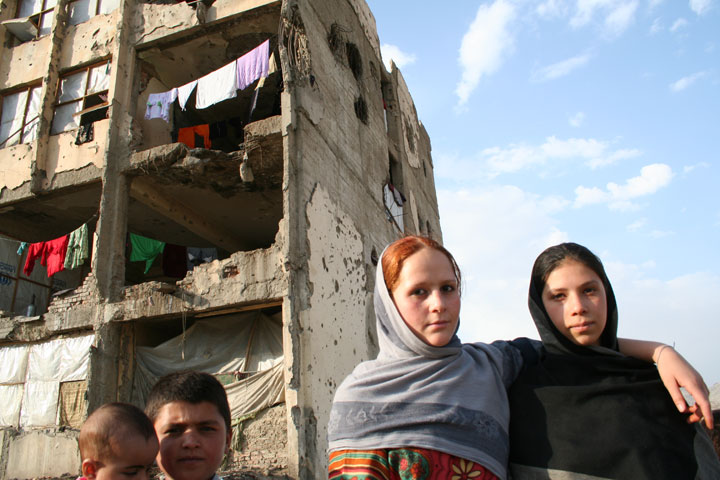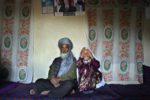“When someone wants to be an artist, because they cannot let what’s going on around them stay the same, achieving fame in the world of art becomes unimportant.” –Alma Suljevic
I am a lover of all art forms, including cinema; the Women Make Movies initiative, and the kind of varied and thought-provoking cinema they help produce, has always captured my interest.
Alba Sotorra’s 2009 film Unveiled Views was a movie I could sit and proudly watch on my own, or even watch with family.
It’s a movie that makes a Muslim woman proud to be a Muslim, or most importantly proud to be a woman who is not looking to be saved by others, as MMW’s Sana describes out in her recent “Broken Record” article. This documentary speaks about women who, in spite of having undergone tremendous personal loss, retain their passions and use them to better their tumultuous world, which is in dire need of reformation.
Like most documentaries, it’s not always what is obviously portrayed or being spoken about that leaves a lasting impression on you. It’s mostly about what is happening around these women, the images that are shown about the country as a whole, where these wonderful women exist and survive. I will be referring to them as the Silent Moments (if any) in my take on each segment.
The movie is about five extraordinary women from five different countries.
Alma Suljevic, clearing minefields, Bosnia
Alma Suljevic is portrayed as redirecting her survivor’s guilt, having survived the Bosnia-Herzegovina war, to clear minefields. Clearing minefields is heroic in itself; however, her refusal to be victimized comes more into play, as she also independently raises the money to continue demining. She does this by selling the earth that she has cleared, in exhibitions across the world. And that, she says, is her favorite part in the whole exercise: Counting the coins and imagining how much de-mining she could do, with every penny she makes.
Rakhshan Bani-Etemad, film director, Iran
Iran’s strict Sharia rules are heavily discussed world-wide. I am personally a huge fan of all films Iranian, because while trying to make meaningful cinema, and get past their strict censorship board rules (no physical contact between man and woman, no hair exposed on a woman, etc.), Iranian directors have been very innovative in portraying and telling stories, through the limited options that they have. And in Rakhshan’s words, her own movies fly over the limitations of the censorship board.
Silent Moments: Pretty young hijabis following some “beautiful and moneydaar(rich)” men, in cars, squealing at them, while very well knowing that they might be arrested for doing this. And they are arrested. Too much oppression has probably led to the birth of a reactive generation, and not all forms of reactions turn productive.
Eren Keskin, human rights lawyer, Turkey
She is wearing makeup, and is in T-shirt and jeans, clothing that might be equated to women’s freedom, in contrast to the image of the oppressed veiled woman. Turkey’s laws require women to unveil in certain contexts, and yet women have very little rights, and are raped and sexually harassed in prisons. Eren Keskin co-founded the project “Legal Aid For Women Who Were Raped Or Otherwise Sexually Abused by National Security Forces,” to expose abuses happening to women in Turkish prisons. This is oppression without the veil, and maybe stands to be made into a story all on its own.
Silent Moments: While portraying Turkey, and the general ambience of the nation, Alba has chosen to show images of slaughtering goats as part of the Eid Ul Adha celebrations, and dogs being put to sleep. These may be seen as portraying Islam in a violent light, and I couldn’t understand why this was necessary to show besides Eren’s story. Are Muslims the only non-vegetarians in this world? I don’t think so. And you can’t eat meat without “killing” an animal first.
Moshagan Saadat, poet, Afghanistan
My favorite segment. A family of eight sisters, all of them with their own individual artistic talents. While the focus is given to Moshagan and her amazing poems, what caught my eye is her attractive elder sister, exercising within the confines of her home. When I was a teenager, I asked my mother, if I could go for a yoga class, and as expected, she said no. She asked me to move around in the house and that’s enough. That’s how it is for many women. So I just loved the way an Afghan woman, who, contrary to popular belief, is shown to take care of her body, which in turn displays deep respect for self.
However, I was left wondering about the kinds of role models (whether parents or others) that influenced the strong sense of self among so many young women in this family. The film failed to give me a sense of how or why Moshagan and her sisters are so inspired. They might be born with talent, but what are the influences in their life that keep them spirited, in spite of having spent their entire life engulfed in war?
Silent Moments: The Mahram rule and its impracticality. Women have a handful of men who are Mahram to them, and those handful could very well have their own lives, and aren’t always available to “be” a Mahram and take them around, which is what is the case in the Saadat household. They are eight sisters, and obviously the father is busy, so to buy groceries Moshagan dresses as a boy and then is forced to pray in the mosque with men.
Nahid Siddiqui, dancer, Pakistan
With the famous Nahid, the film catapults us to the upper class. Here, we have educated women speaking flawless English, and for the first time, a man, also speaking flawless English, share Nahid’s story. Nahid is a world renowed kathak dancer. The minute this segment started, and I saw Nahid dressed in sarees with her anklets, I just knew, that this wouldn’t go well with the Pakistani government, because it looked so Indian. And that was what had happened in her life. From having a program on Pakistani national TV (before the fundamentalist Zia-Ul-Haq regime came in), she was asked by the government to leave Pakistan, if she had to continue dancing.
The Silent moments: While showing the bustling traffic in Lahore, in a shot, we can see a huge fairness cream advertisement. It seems ironic that the government that didn’t let a woman dance, is ok with having fairness creams advertised widely?
All this being said, I am a very teeny bit upset at what the brilliant Alba Sotorra, who hitchhiked from Barcelona to Pakistan to shoot this movie, chose as her film’s title. I am sure that “unveiled” is supposed to have its inner connotations of removing the Western prejudice around Muslim women, who are seen as victims. But if you ask me, the veil is an overused and abused word, and three of the women in the documentary are not seen in the veil at all, so this film about five brilliant women could have used a more appropriate title.





